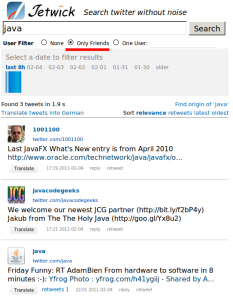Update: Jetsli.de is no longer online. Checkout the projects snacktory and jetwick which were used in jetslide.
We are proud to announce the release of our Jetslide News Reader today! We know that there are a lot services aggregating articles from your twitter timeline such as the really nice tweetedtimes.com or paper.li. But as a hacker you’ll need a more powerful tool. You’ll need Jetslide. Read on to see why Jetslide is different and read this feature overview. By the way: yesterday we open sourced the content extractor called snacktory.
Jetslide is different …
… because it divides your ‘newspaper’ into easily navigatable topics and Jetslide prints articles from your timeline first! So you are following topics and not (only) people. See the first article which was referenced by a twitter friend and others, but it also prints articles from public. See the second article, where the highest share count (187) comes from digg. Click to view the reality of today or browse older content with the links under the articles:
Jetslide is smart …
… enough to skip duplicate articles and enhance your topics with related material. The relavance of every article is determined by an advanced algorithm (number of shares, quality, tweed, your browser language …) with the help of my database ElasticSearch – more on this in a later blog post.
And you can use a lot of geeky search queries to get what you want.
Jetslides are social
As pointed out under ‘Jetslide is different’ you’ll see articles posted in your twitter timeline first. But there is another features which make Jetslide more ‘social’. First, you get suggestions of users if they have the same or similar interests stored in their Jetslide. And second, Jetslide enables you to see others’ personal jetslide when adding e.g. the parameter owner=timetabling to the url.
Jetslides means RSS 3.0
You can even use the boring RSS feed:
http://jetsli.de/rss/owner/timetabling/time/today
But this is less powerful. The recommended way to ‘consume’ your topics is via RSS 3.0 😉
Log in to Jetslide and select “Read Mode:Auto”. Then every time you hit the ‘next’ arrow (or CTRL+right) the current viewed articles will be marked as read and only newer articles will pop up the next time you slide through. This way you can slide through your topics and come back everytime you want: after 2 hours or after 2 days (at the moment up to 7 days). In Auto-Read-Mode you’ll always see only what you have missed and what is relevant!
This is the most important point why we do not call Jetslide a search engine but a news service.
Jetslides are easily shareable
… because a Jetslide is just an URL – viewable on desktops, smartphones and even WAP browsers (left):











